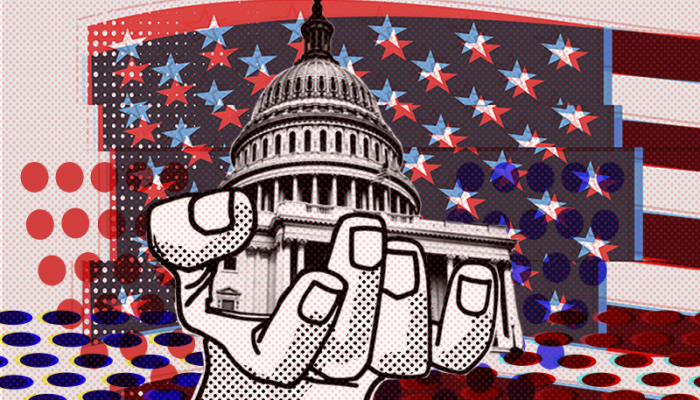Democracy Wins
Voters turned out in huge numbers to overcome suppression and gerrymandering, and Florida registered a massive win for democracy. Now, the work of fixing the system must begin.

In the end, democracy won on Tuesday night.
Voters overcame suppression attempts, long lines, broken machines and nasty weather to turn out in massive numbers in key states. Extreme gerrymandering wasn’t enough to thwart the will of voters in the battle for the House. And Florida registered a massive win for democracy by voting to restore the franchise to those with past criminal convictions.
Still, some voters faced wait times of several hours, often thanks to machine problems, underlining the urgent need to fix our aging voting machines and improve election administration. Georgia, already a hotbed of voter suppression efforts, was the site of particular problems, especially in minority-heavy areas. And the landslide in the House, where Democrats likely won the popular vote by around 9 percent while winning only a narrow majority of seats, shows why we urgently need to unrig the map.
The most important result is a new Congress that’s likely be much more supportive of the reforms needed to strengthen democracy, and far more willing to act as a necessary check on the executive branch. Congress will come closer to reflecting America, too. The House will have a record number of women and minority members — including its first female Native American and its first female Muslim.
In Florida, a ballot initiative to restore voting rights to people with past criminal convictions, which the Brennan Center is proud to have helped draft, passed with strong bipartisan support, ending a ban that had affected over one in five African-Americans in the state. Around 1.4 million people total will now have a voice in their democracy. Not since the 26th Amendment lowered the voting age to 18 in 1971 has a law change conferred voting rights to so many Americans.
“With their vote, Floridians today decided that those who have fully paid their debt to society should feel and act as full citizens, not be relegated to second-class status,” Myrna Pérez, a deputy director of the Brennan Center’s Democracy program, said. “Florida voters today set an example for other holdout states with similar lifetime bans to shed their shameful past. American democracy requires the full participation of citizens.”
We don’t yet know how many voters turned out nationally. But the news from several key states is encouraging. In Florida, for instance, more than 8 million votes were cast in the governor’s race, compared too nearly 6 million in 2014. Texas, and Georgia, too, look set to far exceed turnout from 2014. Despite rainstorms in much of the East, it seems all but certain that the national rate will smash the measly 37 percent recorded in the last midterms. And there’s some evidence that the jump in turnout was especially pronounced, at least in some areas, among racial minorities, who traditionally have been under-represented in midterms.
As usual, there were plenty of voting problems, most of them involving machine issues, long lines, and administrative snafus. And in Georgia, which hosted perhaps the most closely watched race in the country for governor, the situation was especially dire. There were numerous reports of voters in minority-heavy areas facing two or three hour waits, often after machines malfunctioned. It was a reminder that we have much more work to do to ensure everyone can vote without unreasonable hurdles. And, stepping back from Election Day, the range of voter suppression laws and schemes in effect this year was the worst in the modern era.
Republican gerrymandering undoubtedly skewed results in statehouse and congressional races across the country. But, thanks to an energized electorate, it didn’t determine control of the House, as it did once before this decade. Even more important, voters approved measures to reform redistricting in Michigan, Colorado, and Missouri. The Michigan result, particularly, is worth celebrating, because the state has endured perhaps the single most extreme gerrymander of the cycle, and because the reform push was the product of a genuine grassroots movement for democracy. Michigan also approved a separate measure that includes automatic and same-day voter registration, dramatically expanding access to the ballot.
And our systems of justice got fairer, too, with victories for criminal justice ballot measures in Louisiana and Florida.
Where does democracy go from here? The voters spoke loudly for change. Around forty new House members took no corporate PAC money and vowed to fight for democracy reform. The House Democratic leadership has announced it would make such measures the first bill – H.R. 1. Its details are still being hashed out, but it likely will include automatic voter registration, small donor public campaign financing to curb the power of big money, and national redistricting standards. A separate bill will set standards to guard against cyberattacks. Perhaps the most important result from Tuesday is that we now have a Congress that appears to understand urgency of these issues, including many new lawmakers who explicitly ran on a democracy reform platform. Congress should make this its top priority.
Congress also must dramatically step up its oversight role. Its goal should not be to score political points against the administration, but to help get to the bottom of key issues like Russian meddling in the 2016 election, an unprecedented attack on our democracy that still lacks a full accounting. And with a shakeup at the Justice Department likely coming, as well as a report from Special Counsel Robert Mueller, Congress should ensure that our systems of justice and law enforcement justice remain independent and free from political interference.
Despite Tuesday’s good news, we have so much more to do to strengthen our democracy. Let’s get to work.
Photo Illustration: BCJ/Getty



